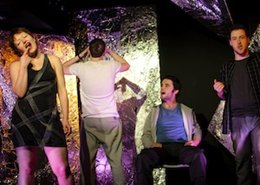The title Delta Phase could be drawn from the three-phase electric power system used by electric grids to transfer power, or the river delta landforms which connect to oceans and seas. Both sources are apt. It is this fusion of the three young male protagonists that creates and sustains the powerful dynamic in this popular Polish play, translated into English by Anna Wolf and John Currivan for Polish Theatre Ireland. Of course, it may just refer to their acid trip. These three lads, Misiek (Lloyd Cooney), Liszaj (Finbarr Doyle), and Mastodont (Jason Duff) may have Polish names and support Polish teams, but the stagnating urban existence translates uncomfortably well to an Irish stage.
Through a narrative dialogue always expressed in the past tense with the corresponding action being performed in front of us, the audience is immediately caught and confused between their recounting of an alcohol and drug-infused night and the present reality. This disorientation is intended. The play forbids clarity and focus for the characters’ lives, and thus makes the audience experience, to an extent, the fog that seems to possess them. Delta Phase conveys the impossibility of a singular coherent reality as all that the characters can identify is their ‘phases’. The play moves between their various phases/time periods in the night’s tragic events, to their attempt to reach the same phase in their narcotic trip – yet it is their rare success in narcotic unity that causes their downfall.
 All the while, the seductive and ghostly bartender Justyna (Kasia Lech) enters and exits the narrative as the boys tell it. She is initially the prize to be won, but refuses to compete in their game. She attempts to set down her own rules, with her the boss and they her slaves. However, her character is never the storyteller, only a part of their story. In a way, Delta Phase stages multiple tragedies. Particularly, it conveys a sense of entrapment which dominates the characters’ fates; a cycle of excess substance abuse and fantasies of violence that will inevitably further their social disempowerment.
All the while, the seductive and ghostly bartender Justyna (Kasia Lech) enters and exits the narrative as the boys tell it. She is initially the prize to be won, but refuses to compete in their game. She attempts to set down her own rules, with her the boss and they her slaves. However, her character is never the storyteller, only a part of their story. In a way, Delta Phase stages multiple tragedies. Particularly, it conveys a sense of entrapment which dominates the characters’ fates; a cycle of excess substance abuse and fantasies of violence that will inevitably further their social disempowerment.
The crisis of masculinity so prevalent in the works of Mark O’Rowe, Martin McDonagh and Conor McPherson dominates these young characters, particularly Misiek, as he first tries to woo the bartender, then challenge the ‘blonde guy’ who also seeks her attention, then finally rapes her to ensure his domination. This destructive masculinity results in strange loyalties for no apparent purpose - “A promise is a promise” - and violent explosions triggered by almost anything. As Misiek, Cooney excels in his portrayal of a young, destructive (yet charming) thug, and the flavour of the play and his performance strongly resonates with O’Rowe’s work, blending the eeriness of Terminus with the energy of Intermission.
Both translation and direction have achieved much here, as the small playing area of Theatre Upstairs is successfully transformed into the underground hell of the sleazy Legend Pub, an acid trip gone wrong, and the audience can almost smell the boys’ fear of facing their Mammies’ wrath and shame. The physicality of the performance ensures the pace of this play never falters, and indeed, may hopefully stretch to a second run.
Miriam Haughton lectures in Theatre Studies at the National University of Ireland, Galway.